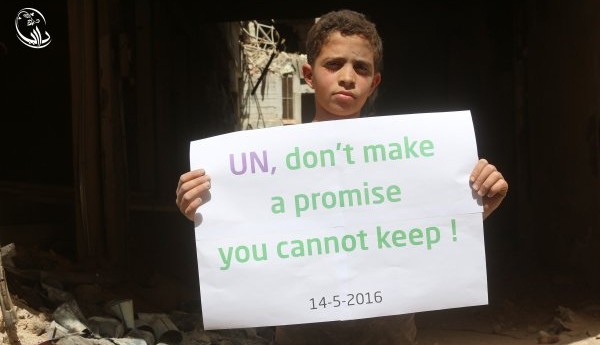PHOTO: A boy in besieged Darayya appeals to UN, May 2016 — The Damascus suburb surrendered to the regime last week
Nick Hopkins and Emma Beals write for The Guardian:
The UN has awarded contracts worth tens of millions of dollars to people closely associated with the Syrian president, Bashar al-Assad, as part of an aid programme that critics fear is increasingly at the whim of the government in Damascus, a Guardian investigation has found.
Businessmen whose companies are under US and EU sanctions have been paid substantial sums by the UN mission, as have government departments and charities – including one set up by the president’s wife, Asma al-Assad, and another by his closest associate, Rami Makhlouf.
See also UN’s $4 Billion Aid effort in Syria is Morally Bankrupt
The UN says it can only work with a small number of partners approved by President Assad and that it does all it can to ensure the money is spent properly.
“Of paramount importance is reaching as many vulnerable civilians as possible,” a spokesman said. “Our choices in Syria are limited by a highly insecure context where finding companies and partners who operate in besieged and hard to reach areas is extremely challenging.”
However, critics believe the UN mission is in danger of being compromised.
They believe aid is being prioritised in government-held areas and argue UN money is effectively helping to prop up a regime responsible for the deaths of hundreds of thousands of its own citizens.
UN insiders admit the relief mission in Syria is the most expensive, challenging and complex it has ever undertaken.
But the contentious decisions it has had to make are now exposed for the first time by a Guardian analysis of hundreds of contracts it has awarded since the operation began in 2011.
This shows that:
*The UN has paid more than $13 million to the Syrian government to boost farming and agriculture, yet the EU has banned trade with the departments in question for fear of how the money will be used.
*The UN has paid at least $4 million to the state-owned fuel supplier, which is also on the EU sanctions list.
*The World Health Organisation has spent more than $5m to support Syria’s national blood bank – but this is being controlled by Assad’s defense department. Documents seen by the Guardian show funds spent on blood supplies came directly from donors who have economic sanctions against the Syrian government, including the UK. They also show the WHO had “concrete concerns” about whether blood supplies would reach those in need, or be directed to the military first.
*Two UN agencies have partnered with the Syria Trust charity, an organisation started and chaired by President Assad’s wife, Asma, spending a total of $8.5m. The first lady is under both US and EU sanctions.
*Unicef has paid $267,933 to the Al-Bustan Association, owned and run by Rami Makhlouf, Syria’s wealthiest man. He is a friend and cousin of Assad, and his charity has been linked to several pro-regime militia groups.
Makhlouf runs the mobile phone network Syriatel, which the UN has also paid at least $700,000 in recent years. Makhlouf is on the EU sanctions list and was described in US diplomatic cables as the country’s “poster boy for corruption”.
*Contracts have been awarded across UN departments with companies run by or linked to individuals under sanctions.
These contracts show how the United Nations operation has quietly secured deals with individuals and companies that have been designated off-limits by Europe and the US.
On top of this, analysis of the United Nations own procurement documents show its agencies have done business with at least another 258 Syrian companies, paying sums as high as $54 million and £36 million, down to $30,000. Many are likely to have links to Assad, or those close to him.
The UN says that its relief work has already saved millions of lives and argues it has to work with the regime if it wants to operate in Syria.

